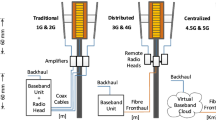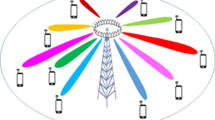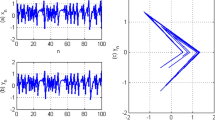Abstract
Multicode DS-CDMA systems assign more than one spreading sequence to each of the users. In these systems multiple access interference (MAI) is made of a synchronous and an asynchronous component. It is well known that asynchronous MAI alone can be minimized by means of chaos-based spreading. Here we address the trade-off between synchronous and asynchronous MAI by tuning the autocorrelation profile of the chaosbased spreading codes. Improvements in the number of users allowed in the system is demonstrated in certain load conditions with respect to the classical approach of providing each user with a set of orthogonal sequences taken from an i.i.d. process.
Similar content being viewed by others
Author information
Authors and Affiliations
Corresponding authors
Rights and permissions
About this article
Cite this article
Vitali, S., Rovatti, R. & Setti, G. On the Performance of Chaos-Based Multicode DS-CDMA Systems. Circuits Syst Signal Process 24, 475–495 (2005). https://doi.org/10.1007/s00034-005-2402-y
Received:
Issue Date:
DOI: https://doi.org/10.1007/s00034-005-2402-y




